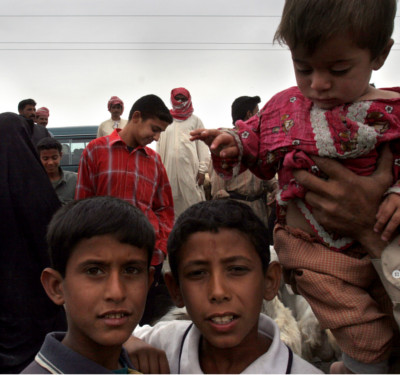The long lasting effects of childhood trauma
Violence or abuse in childhood can cause psychological impairments in adulthood, but family support can mitigate that.
Published online 27 February 2015

Many young adults in Iraq today have heard of or seen someone getting beaten or killed as children.
© susan schulman / Alamy
Traumatic childhood experiences can have lifelong consequences on psychological well-being, but strong family relationships can mitigate their impact in adulthood, according to a new study by Iraqi researchers1.
Experiencing abuse, neglect and violence between family members or within the wider community are all associated with both psychological and social dysfunction later in life. Iraqi children, who have been subjected to political instability and mass violence for decades, are therefore at high risk.
This drove Ameel AlShawi and Riyadh Lafta of Mustansiriya University in Baghdad to perform a large survey of individuals living in the Iraqi capital in 2013 in order to assess the long-term impact of their adverse childhood experiences.
The researchers distributed a questionnaire across health centres and universities among people aged 18–59 to obtain information about their exposure to traumatic experiences and socio-demographic data such as health and level of education. The survey also included a series of questions designed to assess participants’ level of self-esteem.
They received 1,000 responses. Overall, the vast majority of participants (nearly 83%) reported feeling confident in themselves, while more than 28% said they felt useless at times, and nearly 15% said they felt like a failure.
Not surprisingly, many of those who responded to the questionnaire had experienced community violence of some sort or another. Nearly half of them had seen or heard someone being beaten up, and more than 17% had seen a family member or friend killed.
Some also reported dysfunctional family scenarios. Nearly 39% had been shouted at, insulted or humiliated by a parent or other household member, for example, while 33.5% reported having been spanked, slapped, kicked or punched.
But family was also a source of support for these children. The survey revealed that positive relationships within the family made people more resilient to the long-term effects of their adverse childhood experiences.
Specifically, those who reported strong family bonding during childhood were far more likely to report having high levels of self-esteem later on in life. Bonding, defined as a close and emotional relationship between a child and their parents, provides a secure environment for the child, and strongly influences the quality of their future relationships.
“Unfortunately, we don'thave facilitiesin Iraqto treat traumatised children,”says AlShawi, “and so there is an urgent need to build a national programme to improve mental health among Iraqi children and youth.”This effort should be coordinated between national and international organisations, he adds.Reference
- AlShawi, A. F. & Lafta, R. K. Relation between childhood experiences and adults’self-esteem: a sample from Baghdad. Qatar Med. J.2014, 14 (2014). | article
DOI: 10.1038/qsh.2015.51

